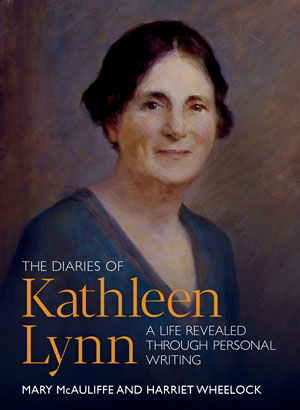MARY McAULIFFE and HARRIET WHEELOCK (eds)
University College Dublin Press
€45
ISBN 9781910820018
Reviewd By Sylvie Kleinman

Sylvie Kleinman is Visiting Research Fellow at the Department of History, Trinity College Dublin, and has worked for the Dictionary of Irish Biography.
‘8 am S. B’s [St Bartholomew’s Anglican Church, Ballsbridge] Griffith died suddenly 10 a.m. cereb. haem. got surprise, sad that he shld go a traitor, he will be an irreparable loss to the F. State.’ This typifies entries (here, 12 August 1922) in the detailed diary that Kathleen Lynn kept from mid-April 1916 to late April 1955, a few months before her passing. A unique insight into both her hectic public routine as a doctor, a pioneering founder of St Ultan’s infant hospital, revolutionary and political activist and her equally busy domestic, personal and affective sphere, it amounts to no less than 900,000 words. This publication has a thorough introduction but only provides extracts arranged in four sequential phases of her life, covering the full 39-year span. The editors underwent a rigorous process when selecting ‘a representative sample of Lynn’s words and life’. With their combined backgrounds in gender, social, revolutionary and political history and also the history of medicine, they then repeated and refined this selection no less than four times to fully reveal Lynn’s life through her self-writing. Her staccato style has been preserved and, while many of the innumerable abbreviations are self-evident (as ‘F. State for Free State, above), others and acronyms are elucidated. Notes briefly identify names and events, but many have not (yet) been identified. There is more than enough to grasp Lynn’s biting humour, feminist and nationalist spirit, sharp interest in international affairs, sensitivity to the kindness of others, Christian piety, and the extreme tenderness and concern expressed for the life partner with whom she lived for some three decades, Madeleine ffrench-Mullen.
The late Margaret Ó hÓgartaigh had stressed that without the diary her linear biography Kathleen Lynn: Irishwoman, patriot, doctor (Irish Academic Press, 2006) would have been nearly impossible to write. She only fleetingly quoted directly from it yet conveyed the many facets of Lynn’s character that jump off the page, which this edition projects more fully, if somewhat disconnectedly. Lynn’s committed republicanism and involvement in electoral politics need no introduction, and so her often biting assessments, captured on the hop, make for some incisive reading. We instinctively jump to 7 December 1921: ‘“Peace” terms but such a peace! Not what Connolly & Mallin & countless others died for.’ ‘On the 9th, “Dev” announced he couldn’t recommend acceptance of peace terms’, and that evening she witnessed ‘Mick’ (Collins) being ‘very truculent to Dev. I never saw anyone so changed for worse’, but she hoped her country would ‘stand by the Truth’. Lynn attended church services seven days a week, and on Monday the 12th she prayed ‘all day for the country’s soul’. Then she noted the newspapers were ‘full of Mick’, appearing more and more as the ‘creature of the British Govt’. Student essays are about to be enriched by these raw insights from below.
Apart from the history of medicine as assessed by a practitioner, Lynn’s diary is a rich and compelling source of insights into gender history. She is emblematic of a generation of women who entered both adult and professional life at a pivotal moment of deep social and political transformation, and made their mark in the public sphere. Attendance at the progressive Alexandra College had opened the door to both a career path and a commitment to activism, not only to assist others but also to inform, educate and agitate for change. But Kathleen Lynn then also embraced militant nationalism, and became a revolutionary and committed republican.
The diary survived many house raids and was eventually donated to the Royal College of Physicians of Ireland (RSPI) in 1997. The archivist Margaret Connolly was promptly appointed to undertake the formidable task of deciphering and transcribing the manuscript. Lynn’s handwriting is not the worst, but her particular methodology complicated matters, as one of the book’s illustrations shows. Once Lynn settled into a writing routine by 1919, she dedicated a page or opening to one calendar day only, making her way down the page by adding an entry for that single day, year after year. A well-chosen illustration displays 24 April 1916: ‘Easter Monday. Revolution, Emer [Helena Molony] & I in City Hall …’ and then progresses down to 1937. She could thus reminisce about certain things: in her second to last entry, 24 April 1955, she noted: ‘A beautiful day like 1916 was’. In this edition, however, some important sequences during pivotal historical moments, or in her personal life, are often truncated. Lynn, who had undoubtedly read Theobald Wolfe Tone’s vivacious and immediate diary, was also conscious of recording, as a participant or witness, history in the making. Frequently rushing, her lines of writing are often crushed together. Connolly’s transcript, quite an accomplishment, re-ordered the chronology of the diary in the conventional day-to-day form, easing the task of researchers.
The manuscript journals are now digitised and available on the RCPI website. While this volume is extremely welcome, our appreciation of Lynn’s activities, friends and opinions is limited owing to its format. Irish historical scholarship has evolved considerably in the past few decades; publishers are far more amenable than those who rejected a proposal in the 1990s, and letters, memoirs and diaries are now far more utilised as primary sources. Hopefully this book will lead to the very necessary step of funding an academic project to deploy a small team to research and produce a complete annotated edition of Lynn’s diary, an exceptional record of the opinions and emotions of an extraordinary, if modest and self-effacing, woman.
